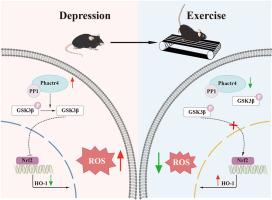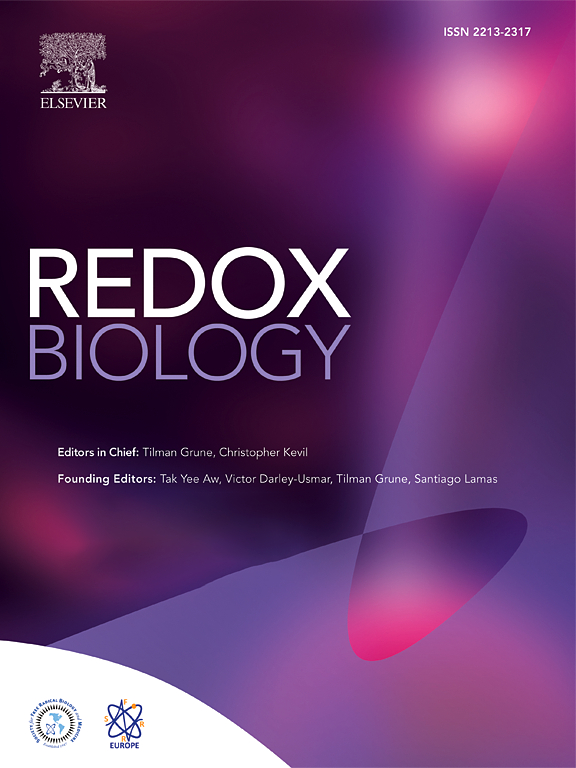Phactr4通过调控PP1/GSK3-β通路促进慢性应激引起的氧化应激和行为障碍。
IF 11.9
1区 生物学
Q1 BIOCHEMISTRY & MOLECULAR BIOLOGY
引用次数: 0
摘要
氧化应激被定义为由自由基积累和抗氧化防御之间的不平衡引发的过程,被认为与许多神经系统疾病有关,包括重度抑郁症(MDD)。在本研究中,我们证实了慢性应激性抑郁小鼠海马齿状回(DG)区磷酸酶和肌动蛋白调节因子4 (Phactr4)的表达增加。Phactr4已被证明通过与蛋白磷酸酶1 (PP1)相互作用增强脑氧化应激,并协同降低糖原合成酶激酶3β (GSK3β)的磷酸化水平,从而增强小鼠对应激刺激的敏感性。敲低海马DG区phactr4可抑制GSK3β的激活,减轻氧化应激,进一步改善小鼠的抑郁样行为。更有趣的是,我们进一步发现体育锻炼可以下调Phactr4的水平,减少大脑中活性氧(ROS)的积累,改善神经元损伤,并逆转小鼠的抑郁样行为。上述结果提示,体育锻炼可能通过下调Phactr4-PP1-GSK3β通路,促进小鼠大脑氧化应激的恢复,改善小鼠抑郁行为。本文章由计算机程序翻译,如有差异,请以英文原文为准。

Phactr4 promotes oxidative stress and behavioral disorder caused by chronic stress via regulating PP1/GSK3-β pathway
Oxidative stress, defined as a process triggered by an imbalance between the accumulation of free radicals and antioxidant defences, has been considered implicated in many neurological disorders, including major depressive disorder (MDD). In the present study, we demonstrated that the expression of phosphatase and actin regulatory factor 4 (Phactr4) was increased within the dentate gyrus (DG) region of the hippocampus of the chronic stress-induced depressive mice. Phactr4 has been shown to enhance oxidative stress in the brain by interacting with protein phosphatase 1 (PP1) and synergistically reducing the level of phosphorylation of glycogen synthase kinase 3β (GSK3β), thus enhance the susceptibility to stress stimulation in mice. Knocking down phactr4 in the hippocampal DG regions can suppressed GSK3β activation, alleviate oxidative stress, and further improve the depression-like behaviors in mice. More interestingly, we further found physical exercise can downregulate the level of Phactr4, reduce the accumulation of reactive oxygen species (ROS) in the brain, ameliorate neuronal damage, and reverse depressive-like behaviors in mice. These findings suggest that physical exercise may promote the restoration of oxidative stress in brain and ameliorates depressive behaviors in mice by down-regulating the Phactr4-PP1-GSK3β pathway.
求助全文
通过发布文献求助,成功后即可免费获取论文全文。
去求助
来源期刊

Redox Biology
BIOCHEMISTRY & MOLECULAR BIOLOGY-
CiteScore
19.90
自引率
3.50%
发文量
318
审稿时长
25 days
期刊介绍:
Redox Biology is the official journal of the Society for Redox Biology and Medicine and the Society for Free Radical Research-Europe. It is also affiliated with the International Society for Free Radical Research (SFRRI). This journal serves as a platform for publishing pioneering research, innovative methods, and comprehensive review articles in the field of redox biology, encompassing both health and disease.
Redox Biology welcomes various forms of contributions, including research articles (short or full communications), methods, mini-reviews, and commentaries. Through its diverse range of published content, Redox Biology aims to foster advancements and insights in the understanding of redox biology and its implications.
 求助内容:
求助内容: 应助结果提醒方式:
应助结果提醒方式:


